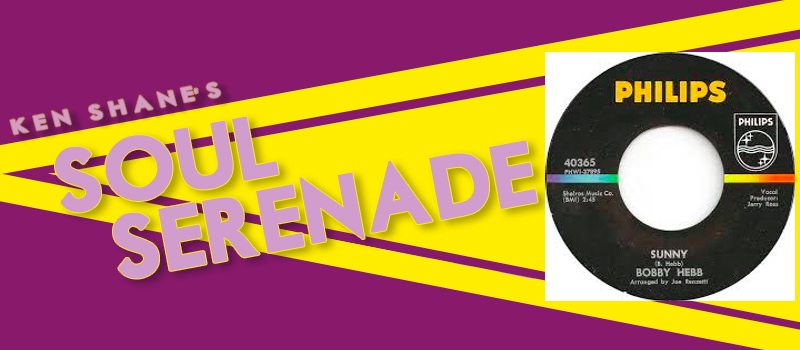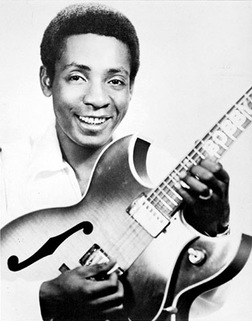 Different people react to tragedy in different ways. Some people weep, and some dance. Some people mourn, and some sing. Bobby Hebb was a singer. But not just a singer, he was a singer with a song that he wrote at a time of personal and national tragedy. The song helped to heal him, and the nation, and it made him a star.
Different people react to tragedy in different ways. Some people weep, and some dance. Some people mourn, and some sing. Bobby Hebb was a singer. But not just a singer, he was a singer with a song that he wrote at a time of personal and national tragedy. The song helped to heal him, and the nation, and it made him a star.
Hebb was born in Nashville. His parents were blind musicians, and together with them and his older brother Harold, formed a washboard band of street performers called the Hebb’s Kitchen Cabinet Orchestra. Despite the fact that country music at the time (and now for that matter) was an overwhelmingly white enterprise, Bobby became a member of Roy Acuff’s Smoky Mountain Boys when he as still in his teens. He played spoons and other instruments in the otherwise all white band.
After serving a stint in the Navy, where he learned to play guitar and trumpet, Hebb realized that his future did not lie in country music, and he began to turn up at the jazz and R&B clubs of north Nashville. In 1955 he took a trip to Chicago, and legend has it that while he was there he played on a Bo Diddley record called “Diddley Daddy,” but there is no definitive proof of that.
Back in Nashville, Hebb sang with a doo-wop group called the Hi-Fis, and played on records by Kid King’s Combo for the Excello label. Eventually he got the opportunity to make his own records for Rich Records, a company owned by DJ John Richbourg. But Hebb was looking for wider acceptance, and a music scene that could provide him with the artistic freedom he was seeking.

In 1961 Hebb moved to New York City. It was there that he wrote the song he became famous for, “Sunny.” On November 23, 1963 his older brother was murdered outside of a Nashville nightclub. Just one day earlier, John F. Kennedy had been murdered in Dallas. Hebb, along with the rest of the nation, was in deep despair.
“I needed to pick myself up,” Hebb said.
One night he came home from a jam session in Harlem which involved a lot of drinking. The early morning sun was just coming up, and the sight of the purple dawn inspired him. Hebb wasn’t the first artist to sing “Sunny” though. Japanese singer Mieko Herota first recorded Hebb’s song in 1965. Then Dave Pike, a vibraphonist, put the song on one of his albums. It was producer Jerry Ross who finally convinced Hebb to record “Sunny.”
“It was done as the last thing on the session, when we only had a few minutes left,” Hebb told Goldmine magazine
“Sunny” was a smash hit, shooting up the chart all the way to #2 in 1966. The record became a calling card that landed Hebb on the Beatles 1966 tour, their last. Also performing on that tour were the Cyrkle, the Ronettes, and the Remains. Unfortunately, Hebb was never able to replicate the success of “Sunny,” although several of his records including “Love Me,” “A Satisfied Mind,” and “Love Love Love” became popular among Northern Soul fans in the UK. Hebb did have another hit as a songwriter however when Lou Rawls scored with Hebb’s “A Natural Man” in 1971. Rawls won a Grammy for the record.
By the early ’70s Hebb was done, thanks in no small part to his problems with alcohol. He did try again with a disco version of “Sunny” in 1976. His career had a bit of a revival when he moved back to Nashville in 2004. He appeared at the Grand Ole Opry, where he had performed 49 years earlier with Roy Acuff. He was also featured in an exhibition called Night Train to Memphis: Music City Rhythm and Blues 1945-1970 that was mounted by the Country Music Hall of Fame.
In 2005 Hebb released his first album in 35 years, That’s All I Know. There was a short tour in Japan in 2008.
Bobby Hebb died in 2010. He was 72 years-old. His song “Sunny” has been covered countless times over the years, including versions by Marvin Gaye, Dusty Springfield, Stevie Wonder, Ella Fitzgerald, Frank Sinatra (with Duke Ellington), Cher, JosÁ© Feliciano, Wes Montgomery, James Brown, the Ventures, the Four Seasons, Nancy Wilson, Jimmy Smith, the Four Tops, and Booker T and the MGs. There is little doubt, however, that Bobby Hebb’s version remains the greatest.





Comments